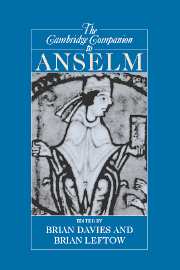Book contents
- Frontmatter
- Introduction
- 1 Anselm’s life, works, and immediate influence
- 2 Anselm on faith and reason
- 3 Anselm, Augustine, and Platonism
- 4 Anselm’s philosophy of language
- 5 Anselm on modality
- 6 Anselm’s perfect-being theology
- 7 Anselm and the ontological argument
- 8 Anselm’s account of freedom
- 9 Anselm on truth
- 10 Anselm on ethics
- 11 Anselm on the Trinity
- 12 Anselm on atonement
- Bibliography
- Index
12 - Anselm on atonement
Published online by Cambridge University Press: 28 May 2006
- Frontmatter
- Introduction
- 1 Anselm’s life, works, and immediate influence
- 2 Anselm on faith and reason
- 3 Anselm, Augustine, and Platonism
- 4 Anselm’s philosophy of language
- 5 Anselm on modality
- 6 Anselm’s perfect-being theology
- 7 Anselm and the ontological argument
- 8 Anselm’s account of freedom
- 9 Anselm on truth
- 10 Anselm on ethics
- 11 Anselm on the Trinity
- 12 Anselm on atonement
- Bibliography
- Index
Summary
Although among philosophers and in the wider world generally Anselm is undoubtedly best known for his ontological argument, this is not where he has exercised most influence. Rather, it is in the field of Christian doctrine, and particularly in his account of the Christian doctrine of atonement or redemption. This influence has been displayed in both positive and negative forms: positive in the way ideas of his were taken up and developed by some later theologians; negative in the way yet others sought to put their own views at as great a distance as possible from those of Anselm. The result is that, though he is sometimes praised, he has more often been savagely criticized, particularly in the modern period. Not all of those criticisms are fair. The problem is that historical context is either ignored or, if acknowledged, explored at an insufficiently deep level. In what follows, therefore, I want to present his position as clearly as possible, noting where misunderstandings have arisen and where potential developments have occurred, or could occur.
- Type
- Chapter
- Information
- The Cambridge Companion to Anselm , pp. 279 - 302Publisher: Cambridge University PressPrint publication year: 2004
- 5
- Cited by



